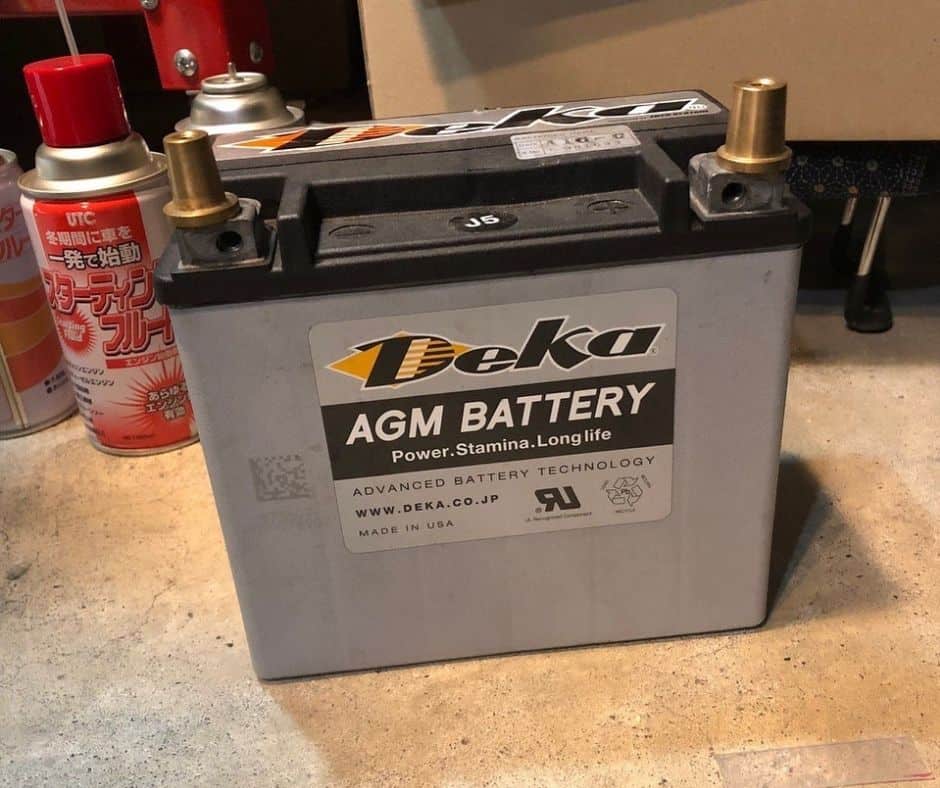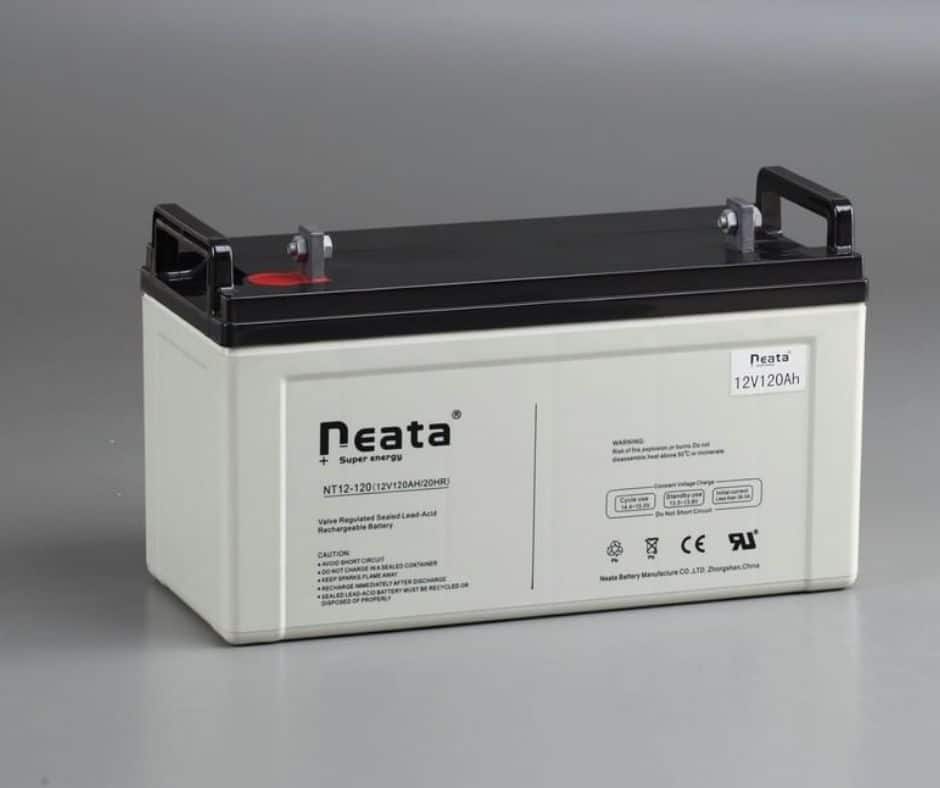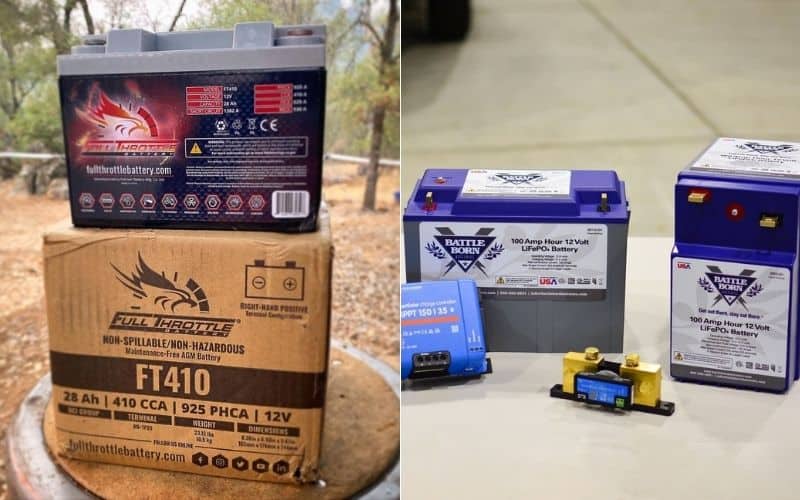Your house batteries serve as the beating heart of your RV’s electrical system. In the past, these were giant banks of heavy lead-acid batteries that typically had a short lifespan of three to five years at best.
Then you had to eat the major investment in buying replacement batteries. Fortunately, rapid advancements in lithium batteries have made them a very popular option for powering RVs.
Though the current marketplace offers RV travelers two options to consider in the form of traditional AGM (Absorbent Glass Mat) and new lithium-ion.
Though the question remains, which is better for your RV?
Both AGM Batteries and Lithium-Ion batteries have their benefits and potential drawbacks for use in an RV. To help you find the best one for your rig, we decided to take a closer look at the nuts and bolts details, as well as how the factor-in real-world performance.
Cost & Overall Lifespan

When it comes to RV batteries, the initial purchase price, and the average expected duration will greatly affect the long-term cost of ownership. For some people, this is a deal-breaker that makes the choice between AGM and Lithium an easy one.
Lithium RV batteries tend to be more expensive than traditional AGM. This is due to the fact that the material construction of AGM batteries is less expensive. They have also been around longer, which makes them more available. The tradeoff here is that lithium batteries tend to have a longer average lifespan.
How Much Does An AGM RV Battery Cost?
The average cost for an RV AGM battery is between $200 to $250.
How Much Does A Lithium RV Battery Cost?
The average Lithium RV battery costs between $350 to $700. Though the prices tend to come down over time as lithium material refining, technology and availability are improving rapidly.
What Is The Typical Lifespan Of An AGM RV Battery?
The typical AGM battery will last for up to five to six years with proper care and thoughtful charging.
What Is The Typical Lifespan Of A Lithium RV Battery?
With proper care and thoughtful recharging, the average lithium RV battery will have a lifespan of around 8 to 10 years. Though 20 years of total life is not out of bounds.
| AGM Batteries | Lithium Batteries | |
| Cost | $200 to $250 | $350 to $700 |
| Lifespan | 5 to 6 years | 8 to 10 years |
Conclusion: When factoring in the long-term cost of ownership lithium batteries are the better overall value in the long term.
Performance Of AGM VS Lithium RV Batteries
When it comes to how they perform in the real world, the benefits and potential drawbacks of AGM and lithium RV batteries are just as pronounced as the differences in their lifespan.
AGM batteries start to experience a decrease in performance once they are discharged below 50%. At the same time, routinely drawing down an AGM RV house battery to below 50% can also damage the battery’s components, which can further shorten the potential lifespan.
This limited depth of discharge means that you will need to take measures to keep “Topping Up” an AGM battery.
Some people will choose to install multiple AGM batteries and connect them in parallel to keep them above 50% of their potential charge.
Though this takes up more space and adds to the overall cost of ownership. Not to mention when it does come time to recharge them, you need to charge multiple batteries on multiple battery chargers. With a lithium RV battery, it performs the same at 98% charged as it does with 10% of the charge remaining. This means you can save space in your RV with a lithium battery.
One thing to note when it comes to performance in the real world is that lithium batteries need to be kept above 32-degrees, whereas AGM batteries will continue to perform all the way down to zero degrees Fahrenheit and below.
This is only a factor if you will be camping in winter conditions, or ice fishing and your battery bank are in an exposed area of the RV.
If your RV’s house battery compartment is in an insulated underbelly or inside the RV’s interior, temperature sensitivity is a non-factor.
Another minor consideration when it comes to real-world performance is that AGM batteries have the cold cranking amp capacity to be used as starter batteries for things like a boat, a riding lawnmower, or for jump-starting a car.
Lithium batteries don’t do well in this regard. So, if you are planning to multi-task your batteries, AGM has more utility.
| Depth Of Discharge Performance | |
| AGM | Fades below 50% |
| Lithium | Performance unaffected to 10% |
Conclusion: You get better performance from a lithium RV battery in the 50% to 10% of charge range. This also translates into a superior lifespan and less maintenance compared to AGM.
Size & Weight

Lithium RV batteries tend to be smaller and lighter than AGM. This makes them especially preferable for smaller RVs like teardrop campers, popup campers, and small travel trailers where space is always at a premium.
Especially when a somewhat limited cargo capacity can affect what gear you pack and what gear you leave behind.
| Weight | |
| AGM | 60 to 120-pounds |
| Lithium | 25 to 60-pounds |
Conclusion: While neither one is prohibitively heavy, you will still have an easier time moving lithium batteries in and out of the RV compared to an AGM battery of the same capacity.
Technology Stability
AGM RV batteries have been around for a long time, and have evolved as far as they are going to in terms of size, weight, performance, and maintenance.
Lithium battery technology continues to evolve. This can mean reductions in the initial purchase price and the potential for better performance in the next generation of batteries.
You might find yourself experiencing some “Buyers Remorse” three or four years down the line if you invest in lithium batteries and then the next generation is cheaper and outperforms your existing battery bank.
Maintenance

Both lithium and AGM batteries are sealed, and are thus considered to be “Maintenance Free.” However, they both can suffer damage from being over-charged, which produces damaging heat and can shorten the lifespan of the cells inside the battery.
With an AGM battery, the cost of replacement is lower than a lithium battery. So, if you do decide to go with a lithium RV battery, it’s wise to protect your investment by getting a smart charger and/or installing a battery monitor in your RV.
Lithium batteries have a better long-term value than AGM batteries when it comes to using them as RV house batteries.
Is a lithium battery better than a AGM battery?
While they do cost more upfront they last longer, they offer a great return on investment. The fact that they also perform better below 50% of charge, weigh less, and take up less space is also very beneficial for RV use.
The case to be made for AGM batteries is that they can be used for more than just RV house batteries, and cost less. They only really make sense compared to lithium if you are working with a limited budget right now, but hope to invest in the next generation of lithium batteries in 5 to 6 years.






